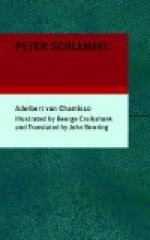And the deeper the silence became, the more intently did the Child listen, and at last the slightest sound thrilled him from head to foot. At length, all was still as death in the wood; and the world seemed as if it never would wake again. The Child bent forward to see whether it were as dark abroad as in the cave, but he saw nothing save the pitch-dark night, who had wrapped everything in her thick veil. Yet as he looked upwards his eyes met the friendly glance of two or three stars, and this was a most joyful surprise to him, for he felt himself no longer so entirely alone. The stars were, indeed, far, far away, but yet he knew them, and they knew him; for they looked into his eyes.
The Child’s whole soul was fixed in his gaze; and it seemed to him as if he must needs fly out of the darksome cave, thither where the stars were beaming with such pure and serene light; and he felt how poor and lowly he was, when he thought of their brilliancy; and how cramped and fettered, when he thought of their free unbounded course along the heavens.
CHAPTER XI.
But the stars went on their course, and left their glittering picture only a little while before the Child’s eyes. Even this faded, and then vanished quite away. And he was beginning to feel tired, and to wish to lay himself down again, when a flickering Will-o’-the-wisp appeared from behind a bush—so that the Child thought, at first, one of the stars had wandered out of its way, and had come to visit him, and to take him with it. And the Child breathed quick with joy and surprise, and then the Will-o’-the-wisp came nearer, and sat himself down on a damp mossy stone in front of the cave, and another fluttered quickly after him, and sat down over against him and sighed deeply, “Thank God, then, that I can rest at last!”
“Yes,” said the other, “for that you may thank the innocent Child who sleeps there within; it was his pure breath that freed us.”
“Are you, then,” said the Child, hesitatingly, “not of yon stars which wander so brightly there above?”
“Oh, if we were stars,” replied the first, “we should pursue our tranquil path through the pure element, and should leave this wood and the whole darksome earth to itself.”
“And not,” said the other, “sit brooding on the face of the shallow pool.”
The Child was curious to know who these could be who shone so beautifully, and yet seemed so discontented. Then the first began to relate how he had been a child too, and how, as he grew up, it had always been his greatest delight to deceive people and play them tricks, to show his wit and cleverness. He had always, he said, poured such a stream of smooth words over people, and encompassed himself with such a shining mist, that men had been attracted by it to their own hurt. But once on a time there appeared a plain man, who only spoke two or three simple words, and




